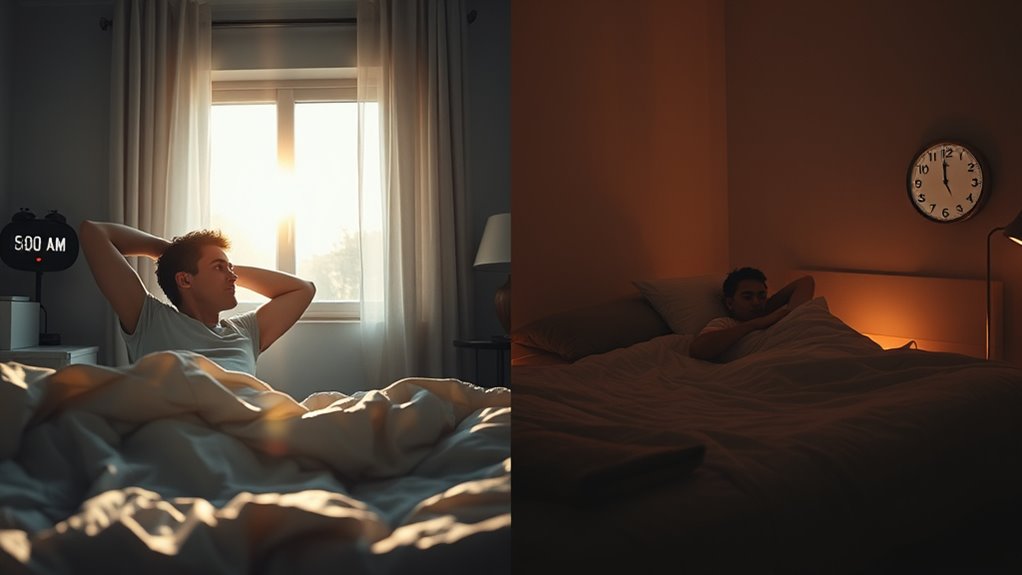Choosing between waking earlier or going to bed earlier depends on your personal rhythm and goals. Waking earlier gives you quiet mornings to plan and boost productivity, especially if you’re a morning person. Going to bed earlier can improve sleep quality and help morning grogginess. Both strategies benefit from consistency and should suit your lifestyle. To discover which approach works best for you and optimize your routine, explore the details ahead.
Key Takeaways
- Waking earlier provides quiet morning time and boosts productivity, especially for morning persons.
- Going to bed earlier improves sleep quality and aligns with circadian rhythms for restorative rest.
- Both strategies depend on individual energy patterns and daily commitments for maximum effectiveness.
- Consistent sleep and wake times enhance circadian regulation, benefiting overall health and mental clarity.
- Experimenting with both approaches helps determine whether earlier waking or sleeping better suits personal needs.

Deciding whether to wake up earlier or go to bed earlier can considerably impact your overall sleep quality and daily productivity. Both choices influence how rested you feel and how effectively you accomplish your tasks, but understanding which option benefits you most depends on your personal rhythm and commitments. When you wake up earlier, you often gain quiet, uninterrupted time in the morning, which can boost your productivity levels. This extra time allows you to plan your day, complete important tasks, or engage in activities that set a positive tone for the hours ahead. If you’re a morning person, waking earlier can align well with your natural energy peaks, leading to improved sleep quality because you may find it easier to fall asleep earlier and wake up feeling refreshed.
On the other hand, going to bed earlier can profoundly enhance your sleep quality by ensuring you get enough restorative sleep, especially if you’re currently sacrificing sleep to stay up late. An earlier bedtime helps you synchronize with your body’s circadian rhythm, making it easier to fall asleep and maintain deep sleep cycles. Better sleep quality directly correlates with higher daytime productivity, as well-rested individuals tend to be more alert, focused, and better at decision-making. If you’re someone who struggles to wake up feeling energized or feels fatigued during the day, shifting your bedtime earlier might be the more effective choice. It can also reduce the chances of sleep deprivation, which hampers cognitive function and overall health. Additionally, the role of sleep quality, which is greatly influenced by your bedtime, is essential for maintaining overall well-being and mental clarity.
The key is to evaluate your current habits and identify which change could bring the most benefits. If you find yourself waking up tired despite sleeping the recommended hours, adjusting your bedtime earlier might be the solution. Conversely, if you’re waking up early but feeling groggy or unproductive, it could mean you need to go to bed earlier to improve sleep quality. It’s important to remember that neither approach works in isolation; they complement each other. For ideal results, aim for consistency. Going to bed and waking up at the same times daily helps regulate your internal clock, leading to better sleep quality and sustained productivity levels over time.
Ultimately, the decision hinges on your lifestyle and how your body responds. Some people thrive waking early and rising with the sun, while others find they perform best with an earlier bedtime that allows for more hours of restful sleep. Experimenting with both strategies and observing how you feel can guide you toward the most effective routine for your health, energy, and productivity.
Frequently Asked Questions
How Do Circadian Rhythms Influence Sleep Preferences?
Your circadian rhythms heavily influence your sleep preferences by regulating melatonin production, which signals when you feel sleepy or alert. Light exposure, especially in the morning, helps suppress melatonin, making you feel more awake and aligned with daytime activities. Conversely, reduced light in the evening allows melatonin levels to rise, encouraging sleep. Understanding this cycle can help you optimize your sleep schedule by managing light exposure.
Can Shifting Sleep Times Improve Mental Health?
Shifting your sleep times can improve mental health by enhancing sleep quality and boosting productivity. When you align your sleep schedule with your natural circadian rhythms, you wake up feeling more refreshed and alert. This better sleep quality supports emotional regulation and reduces stress. By going to bed earlier or waking up earlier, you create a routine that fosters mental clarity, resilience, and overall well-being, making your days more productive and balanced.
What Are the Long-Term Effects of Waking Earlier?
Waking earlier can lead to improved long-term health, especially if you reduce your sleep debt. Research shows morning people tend to have higher productivity and better mental health over time. By consistently waking earlier, you might experience increased energy, better focus, and improved mood. However, if your body isn’t used to it, you could initially face fatigue. The key is maintaining a regular waking schedule to access these lasting benefits.
How Does Age Affect Optimal Bedtime and Wake Time?
As you age, your sleep patterns change due to age-related sleep changes, meaning you might need different bedtimes and wake times. Younger people often stay up later and wake later, while older adults benefit from earlier sleep schedules. Sleep age adjustments help you feel rested and alert. Adjust your bedtime and wake time to match these natural shifts, ensuring you get quality sleep and maintain overall health.
Are There Specific Activities That Benefit From Waking Earlier?
Waking earlier is like catching the sunrise—it sets a positive tone for the day. You’ll find that morning routines and productivity habits benefit most from this shift. When you wake up early, you gain extra time to plan, exercise, or work on important tasks without distractions. This boosts focus and efficiency throughout the day, helping you accomplish more and start each morning with purpose and clarity.
Conclusion
Ultimately, whether you wake earlier or go to bed sooner, the key is finding what works best for you. Both habits can boost your productivity and well-being, but forcing one over the other might not yield the desired results. Remember, it’s not about beating around the bush but about creating a routine that fits your lifestyle. Sometimes, you have to strike a balance and go with the flow to truly thrive.









